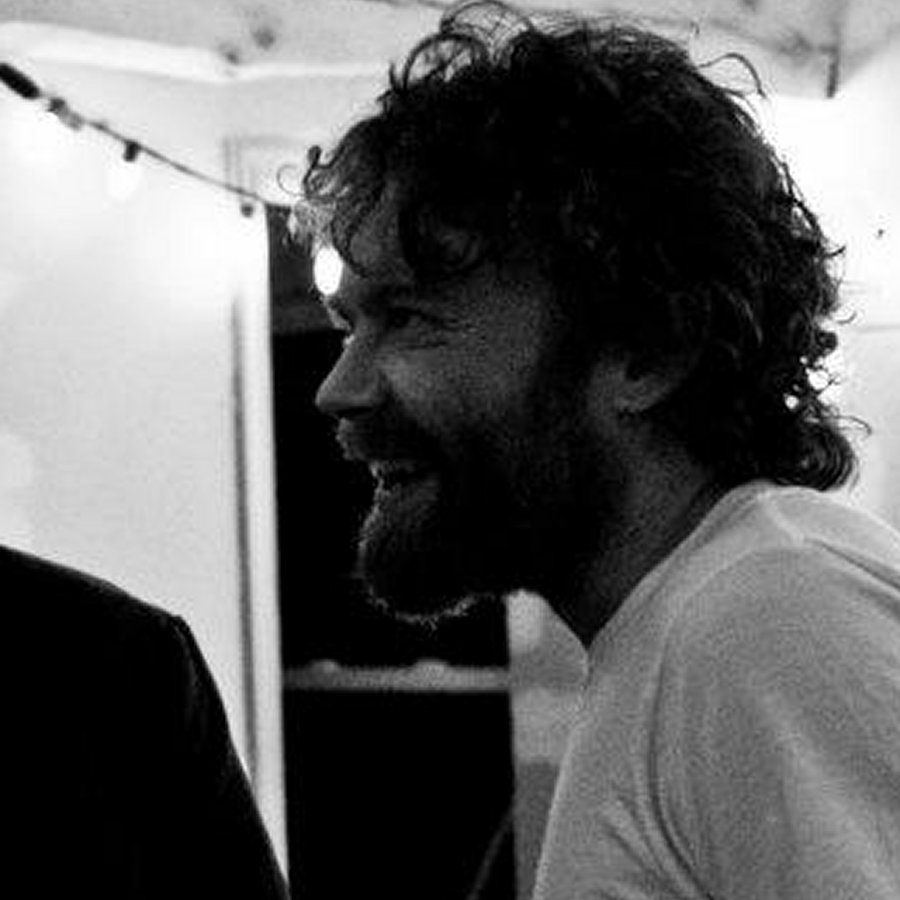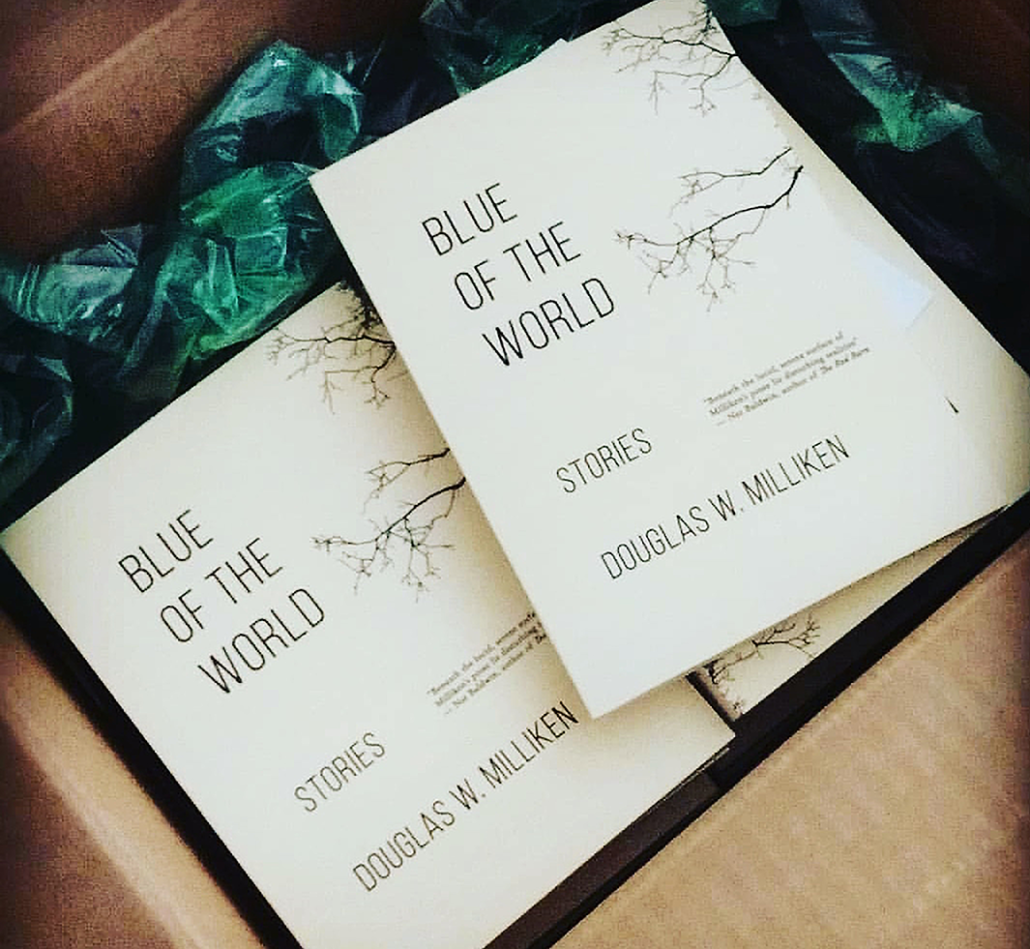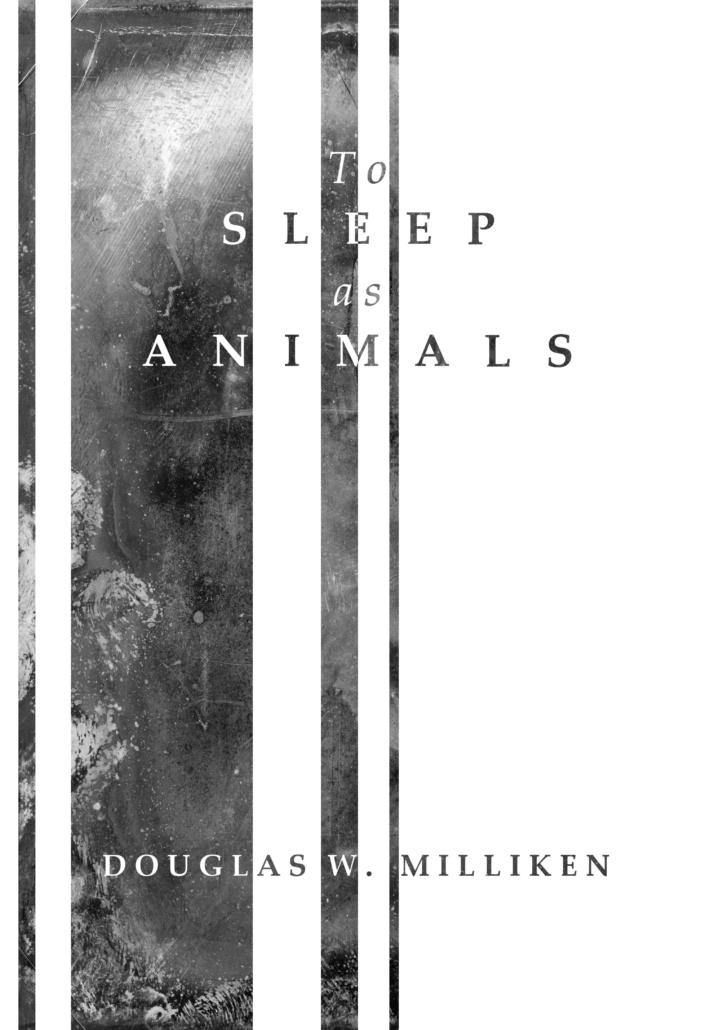An Interview with Douglas W. Milliken
Author Douglas W. Milliken, who contributed his story “Thirteenth Apostle’s Star” to Baobab Press’s This Side of the Divide: Stories of the American West, discusses craft, beginnings, and living as a professional writer. “Thirteenth Apostle’s Star” along with several other excellent stories appear in Douglas’s second book, The Blue of the World, from Tailwinds Press. His first book, To Sleep as Animals, was published by Publication Studio/PS Hudson.
Milliken’s stories demonstrate an impeccable eye for the slightly askew and uncanny in and of images, objects, and people. Written in accessible yet exultant prose these stories are studies in rendering emotion through detail and tone. This work is an immersive experience, startlingly subtle, deftly-crafted .



Baobab Press: Douglas, your connection with landscape is apparent, so much that it becomes a character. How did you land on this approach to fiction? Do you think this approach lends itself to the beauty of your prose?
Douglas W. Milliken: I grew up in a very remote part of northern Maine, in the last house on a dead-end road far from the nearest town, so a lot of my time was spent solo, usually wandering around in the woods and fallow pastures behind the house or reading in the cemetery down the road. In a sense, that spread of acreage was my most consistent companion. There was a ghostliness to the overgrowth and wind and rolling shoulders of the ground underfoot. Somehow, in all that abounding solitude, that ghostliness made me feel less alone.
When I was eleven or twelve, I finally got glasses (despite having lobbied for and known I needed them for years) and I remember, driving home with my mom from the optometrist wearing my big chunky coke-bottles for the first time, realizing that I could actually see the individual leaves on the trees, that the vibrant world surrounding wasn’t just a green blur below a blue blur but in fact was dizzying with richness. I’d become so used to my near blindness that I’d forgotten how the world persisted in detail when it was beyond arm’s reach. It was such a rush of way too much. My life up to that point revolved around spending time out in the woods, yet with the pedestrian suddenness of slipping on a pair of glasses, I was confronted with the dropkick epiphany of just how much I’d been missing.
BP: To Sleep as Animals takes place in Nevada. Did you find it difficult to write about this landscape?
DWM: Not at all. The summer I spent in Reno was the first time I’d ever really been outside the Northeast, and while it was immediately evident how extreme the landscape was (I mean, even the thistles were next level), it was equally evident how teeming and varied the place was and how nearly none of that resembled the world from which I’d come. I really couldn’t help but fall in love with it, memorize it as best I could. I hope I’ve done it justice in my writing.
BP: Many of your stories are akin to legends or tales through their otherworldliness. What effect do you want this dream quality to have on the reader? Why present the world this way?
DWM: I think people are a lot more accepting of unlikely phenomena than the movies suggest. I’ve never known anyone to go running and screaming down the street because they think their house is haunted. But I know a ton of people who very casually believe ghosts are responsible for things they can’t explain (or angels or demons or whatever). Because the brain is always trying to make sense of the sensory input it receives: it wants there to be a cogent whole to what we experience. So we adapt to the weirdness, incorporate it into our understanding of reality (or we deny it: denial is wicked popular). In that sense, a minor hallucination of a muppet in the kitchen actually sits quite comfortably next to the flies circling the ceiling fan or the bottle of Cholula on the table.
All that said, I have variously and purposefully throughout my life entered into that same general strangeness, primarily through sleep deprivation or interrupting my sleep cycle with the explicit intention of altering my conscious state. It was in fact the entire spring before flying out to Reno that I dove deep into personal sleep disturbance, waking myself from REM sleep three or four times in the few hours I allowed myself to rest, all in order to keep a dream journal for a class. I’ve also (less fun, less purposeful) been lead-poisoned as an adult, which turns out to have very similar psychological results (I’m amazed I can coherently string together even the simplest sentence). But regardless of how I got there, that waking-dream reality is something I’ve very much experienced, so I guess it stands to reason I would write about it with an air of casual plausibility.
Whether my characters are working through something surreal or banal, though, my end goal is the same: to depict as accurately and honestly as possible what it feels like to be this person, living this life, surviving these things. So if the character is unalarmed by and accepting of the muppet in the kitchen, man, who am I to say that’s weird? The scene’s got to be described with equivalent acceptance and calm.
BP: What did you read when you became a reader? When you were getting into writing? Is it dramatically different from what you read now?
DWM: The first book I read on my own was about seven (apparently identical) brothers who each had a special invulnerability. One could not be smothered, another could not drown, another could not be hanged, and so on down the line. The story begins with one brother being wrongfully accused of murder (he should actually have been tried for manslaughter) and sentenced to death by hanging, but on the day of the execution, the brother who can’t be hanged stands in for the original and, of course, survives. So then it’s execution by fire or by smothering or whatever, and with each attempted execution, a different brother stands in to save the life of the original criminal brother. I can’t remember how the story ends except that none of the brothers die (I guess the townspeople got tired and gave up). But I think it’s telling that, at four years old, I was already drawn to stories about death, punishment, and identity.
I was in 6th grade, though, when writing became a concrete and conscious act. Throughout my childhood I was writing stories or constructing narratives around my drawings of demons and monsters or whatever, but it wasn’t until Mrs. Thurston started assigning writing projects—like really encouraging us to come up with our own stories—that I first recognized the joy I found in storytelling. At the time, I was reading Margaret Weis and Tracy Hickman’s fantasy cycles, Timothy Zahn’s Star Wars novels, and a ton of Stephen King—although Carlos Casteneda and The Autobiography of a Yogi by Paramahansa Yogananda were somehow also part of the mix—so those early stories bounced around a lot between the grotesque and the mystical, space operas and psychedelic psychopaths and that sort of thing.
Which, to an extent, I really do miss (the stuff I read, I mean, not the stuff I wrote). I still enjoy the genres, but have found way more enjoyment recently in watching those stories as opposed to reading them (few things are as comforting as the warm familiarity of Captain Picard’s command to make it so). Now and then I’ll attempt writing within a genre, but the resultant stories are always perversions far afield of classic sci-fi or horror. Which is fine: I don’t think I’d find much joy in writing a by-the-books fantasy novel (although it’d be dope to just once, with authority and just cause, have a dragon appear in a story). As much fun as that stuff is, I love the work I’m making now, informed as much by Joan Didion and Denis Johnson as Hanne Darboven and Busdriver. If writing the weird existential nightmares I write means I have to spend more of my time reading Werner Herzog describing Werner Herzog, it’s a price I’m willing to pay.
BP: When/where do you think you started to write in earnest/ became a writer?
DWM: There’s not really a single ah-ha moment so much as many notices and reminders that this is what I love and I’m capable of doing it better. Mrs. Thurston’s language arts class, as I mentioned, made me aware of the satisfaction of rendering a vivid, textual world. My semester-long experiment in sleep deprivation coincided neatly with a tremendous surge in productivity, but that could just as easily (and perhaps more rightly) be attributed to finally having a community of supportive, driven artists to engage with: it’s when I found friends who were actively doing art that I stopped talking about being a writer and really started to work. The time I spent immersed in the Salt Institute for Documentary Studies’ writing program definitely marked a new level of dedication, as did the winter after my mother died when—with nothing else to do but grieve and get lonely—I drafted To Sleep as Animals in six breathless weeks. And so on. It’s like leveling-up in a video game. I reach a certain aptitude in my work and practice, then an event comes along that tells me, “you could be doing this harder, you know.” Each of those events is when I become a writer again.
BP: What do you do for a living and how does this vocation align with, help, and/or hinder your goals as a writer? What are your goals as a writer and for your writing?
DWM: After having spent most of my twenties wrecking my body in one trade or another, I’ve finally cobbled together a system wherein I work the apple harvest each fall, pick up freelance editorial gigs here and there throughout the year, and spend the rest of my time writing and engaging in all the consequent business of being a professional writer (which is to say, sending out countless emails and every now and then getting high off giving a reading). So obviously some years are better than others, but between having inexpensive vices, a small amount of money saved or inherited, and a partner who is okay with (and better at) being the breadwinner, everything somehow remains above water. At least for the time being.
Working the apple harvest kinda began as a stop-gap between other seasonal jobs and attending artist residencies. But after my first season in the orchard, I started selling stories and traveling to give readings more consistently, so the harvest became an opportunity to give myself a few months’ break from being a writer and let someone else be the boss, allow my mind to wander while my body did the work. But I’m not sure that’s how it’s really worked out. Some years, fall is when I have the most opportunity to give readings or when a new chapbook is published. Sometimes the apple harvest is slim, which means I end the season with less cash than I’d hoped. And sometimes winter arrives and I feel totally disconnected from the work I’d been doing earlier that summer. But I love being in the orchard—by the time October gets crisp, there’s nowhere else I’d rather be—so I guess it’s worth it. (I think it’s worth noting that all the stories in the collection that somehow involve apples—like “Saltwater Baldwin” or “Blue of the World”—were written before I began working in orchards.)
As far as goals, man, I just want to have my stories read and not have to work for some [expletive deleted]. I’m very aware that what I do is not for everybody, but when a piece clicks with someone and they share that with me, their reaction is affirmation enough to keep doing whatever it is I’m doing. In another time or place, maybe I’d have been a rabbi or a shaman or whatever other vocation there is whose aim is to reach toward the ineffable and in the process connect with another human, share in that ineffability. Although maybe that’s just communication, what any one of us are attempting at any given moment. Just struggling to connect with another human being. No wonder it’s such lonely work.

